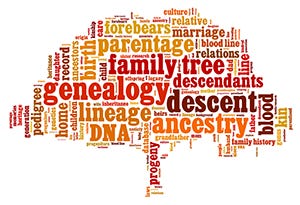Genesis 5 brings us the first of many biblical genealogical records.
The Bible is pretty unique in the world of literary works in that it crosses over pretty much every genre imaginable. As we see here, it’s a history book and genealogical record. But, at points, it’s a book of poetry. At others, a great suspense/thriller novel. At others, a mystery. At other still, a song book. It’s a love story. It’s a book of the law. It’s a how-to guide. It’s a prophecy. It’s philosophy. It’s an epic narrative with heroes and villains and plots and sub-plots and plot twists and cowardice and bravery and sex and horror and greed and indulgence. It’s got the worst of humanity and the best of it. It’s got wrath and love, injustice and justice, brutality and mercy, judgement and grace, the lowest form of sadness and the highest form of joy. It’s rated G in some parts and rated beyond R in others. There’s simply no other book like it. It’s the greatest story ever told.
That said, when I’m doing my Bible reading and I get to sections of genealogy like this one in Genesis 5, my eyes usually glaze over and my thought shifts to what I’m having for lunch that day or daydreaming about Amarillo’s Buccee’s or thinking about my to-do list for the day.
I like stories. I’m bored by lists of people’s names. The more I thought about it though, the more I realized the depth of the significance of these genealogical lists in the Bible. For one, there are about 25 such genealogical lists in the Bible. https://www.esv.org/resources/esv-global-study-bible/facts-1-chronicles-6/). They tend to mark major moments in Israel’s history, and the writers of the Old Testament clearly went to great effort to preserve them for all time. So, God thinks genealogies are significant. Additionally, to this day, there is something inborn in humanity that makes us curious about our bloodline. Don’t believe me? Look at humans throughout the generations. We’ve always cared a great deal about our ancestry and that of others. Falsification of patents nobility was a rampant problem back in the day. Today, we aren’t so formal. We just claim that our second cousin twice removed is related to some celebrity. Also worth noting, some of the greatest sins in human history were committed by people who worshiped a certain heritage…or hated another.
According to Ancestry.com, it has more than 3 million paying subscribers, 15+ million people DNA tested. 1+ billion searches monthly. (https://www.ancestry.com/corporate/newsroom/press-releases/ancestry-surpasses-15-million-members-its-dna-network-powering-unparalleled#:~:text=About%20Ancestry%C2%AE,of%20Ancestry.com%20Holdings%20LLC.) To me, that’s commercial proof that there is something inborn in us that wants to know where we came from. We want to know our heritage. We want to know our ancestry. Genesis 5 begins to answer that question.
When I read this list of names in Genesis 5, I read it as sort of the opening credits to the greatest story ever told.
When I look through the cast of characters, it’s pretty clear that the Bible is guiding me to one of these characters in particular. And, it does so using a clever literary technique of an unexpected break in a redundant pattern. Here’s the pattern. This guy had some kids. Then, he died. And his son had some kids. Then, he died. And his son had some kids. Then, he died. Then, we get to the 7th name (the Bible has a thing with 7s), and the pattern breaks. Enoch “walked with God; then he was no more, because God took him away.” 1 dead. 2 dead. 3 dead. 4 dead. 5 dead. 6 dead. 7 God took him away. It’s as if the Bible is saying, “Which of these do you want to be like?” Dead? Dead? Dead? Dead? Dead? Dead? Or, Alive?”
Well, I’ll take the guy who didn’t die. That sounds nice. And, the Bible even tells you how to be like that guy. Note what the Bible doesn’t say here. It doesn’t say: Dead. Dead. Dead. Dead. Dead. Dead. And then Enoch followed all the rules and lived happily ever after. Or and then Enoch lived a sinless life and God whisked him away. No, in three words the Bible summed up what it takes to avoid dead dead dead dead dead dead. What does it take? It takes actively building a relationship with a God who cares enough about you to enjoy walking with you. Then, take a walk with him. Not a run. Not a jog. Not an email conversation. Not a phone call. Not three prayers a day: morning, noon, and night. No, you walk with God to avoid the dead. It’s active. It’s personal. It requires a little effort. Then, God will take you away. Alive.





So meaningful, thank you!
Thank you, Josh, for your insight and your willingness to share with us. Lin and I pray for all your family every day. We love y'all.